When people first start using propane tanks, there’s always a bit of anxiety around handling them. It’s easy to imagine explosions and other things going wrong, especially when it’s hot outside or you need to use a propane tank under direct sunlight.
The risks, however, are usually overblown. Small, common sense safety tips will prevent anything bad from happening.
In general, propane tanks belong outside in a place with good shade and airflow. Don’t keep anything flammable near them.
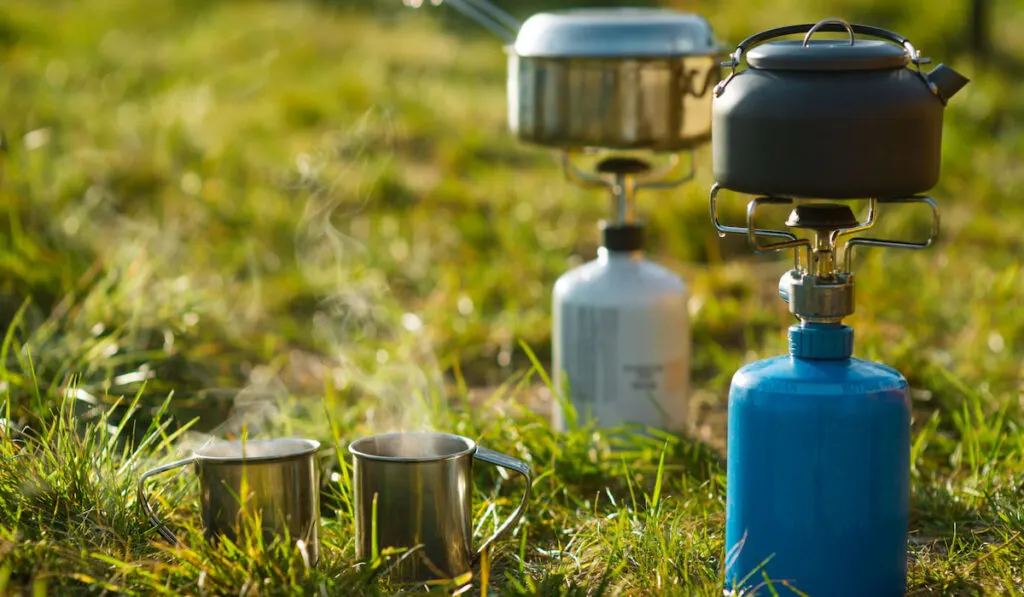
It’s not hyperbole to say that proper propane tank storage can save lives. Whether on a camping trip with a full tank or keeping your tank at home in between vacations, keeping them in the right spot away from other hazards will lower the chances of accidents and eliminate fire risks.
Here are some things you need to know about storing camping propane tanks for maximum safety. Following these steps will keep you and your family safe and guarantee your tanks are always ready to go.
Table of Contents
Follow These Basic Safety and Storage Tips
It doesn’t take a lot to keep your propane tank stored safely. So, here’s what you should do:
Step 1 — Turn Off the Valve
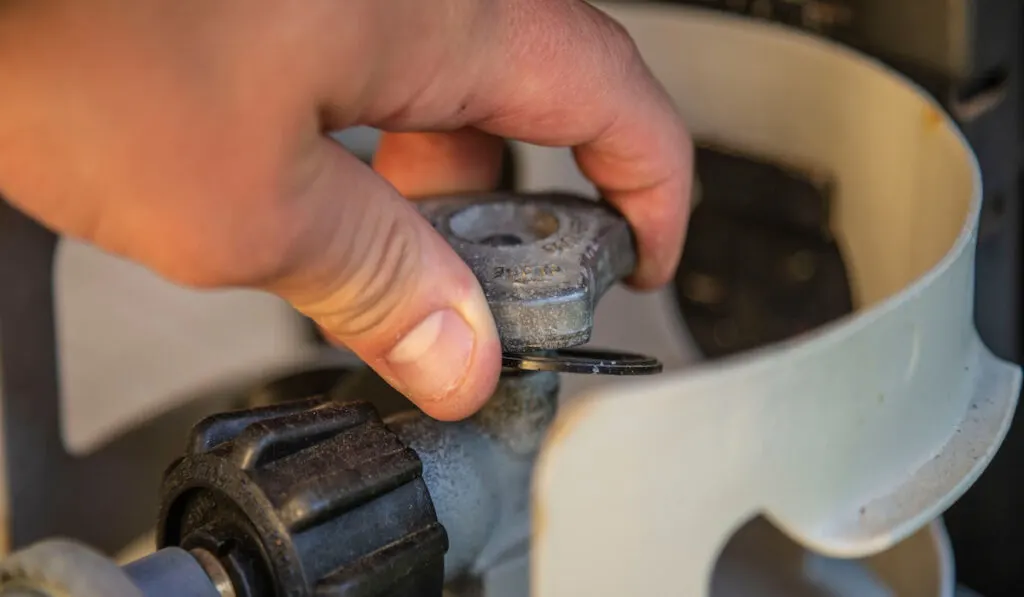
Keep the valve turned tightly in the off position whenever you’re not using your propane tank. This stops the gas flow and makes it impossible for gas to escape.
While there are faulty valves out there, the chances of leaks are slim if you turn the valve off.
You should turn the valve all the way off before disconnecting the propane tank from whatever it’s fueling.
Check to see that no gas is moving before you disconnect the tank, whether it’s a stove, a grill, or a generator.
Step 2 — Find a Flat Surface
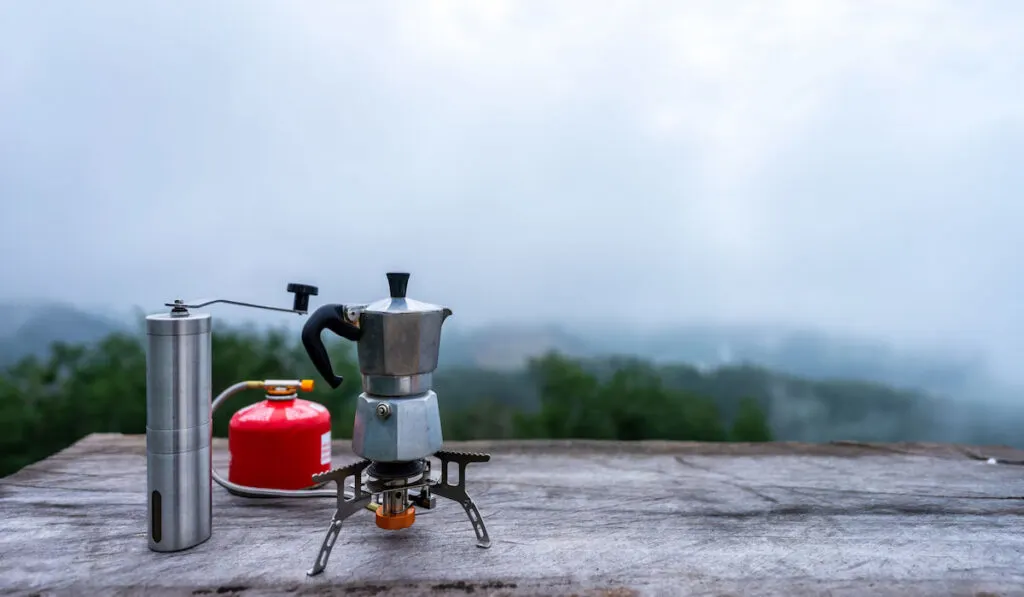
We’ve already said that propane tanks should be outside and in a place with good ventilation. While the odds of an accident in hot weather are slim, you don’t want to take any chances.
A flat surface prevents your tank from tipping over and rolling down a hill or colliding with anything else. Imagine a worst-case scenario where a propane tank tumbles into a camping fire, for example.
Most tanks, and full tanks, in particular, are heavy. They likely won’t be going anywhere if they’re on a flat surface — unless someone lifts them up.
Step 3 — Keep Propane Tanks Away from Other Heat Sources
Storing your propane tank in the shade prevents the sun from heating it up, but what about other sources of heat?
When you’re thinking of places to store your tank, you also need to keep it away from appliances like dryers, grills that you use, generators, and anything that generates heat.
It’s also a good idea to keep your tank away from any electrical wiring. God forbid there is an electrical fire, and your tank is in the area.
Step 4 — Move Your Tank If Temperatures Spike
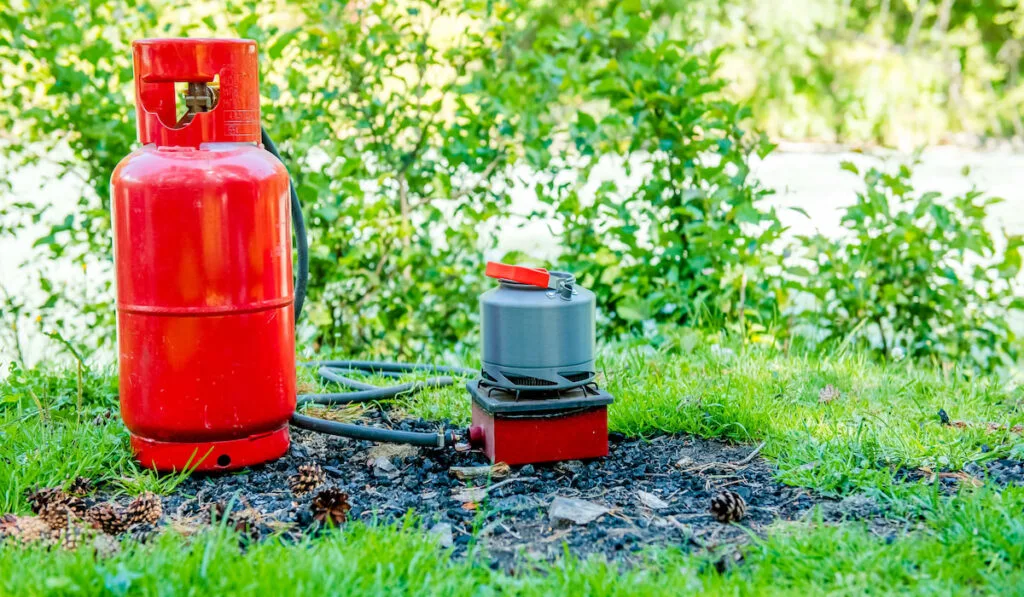
When temperatures spike, you may have to move your tank somewhere cooler.
Explosion risks or pressure release can happen when temperatures exceed 115°F.
Now, you may be thinking that it’s impossible for it to get that hot, but if you make the mistake of keeping your propane tank in the shed or garage when it’s hot, then you should be concerned. Temperatures in places like that can reach much higher temperatures outside due to the lack of wind and ventilation.
Unless things get extremely hot outside, then storing your tank under the shade outdoors away from other heat sources is the way to go.
Step 5 — Ideas for Places to Store the Tank
If you’re still having trouble thinking of places to store your tank, here are a few ideas.
- First, if you have a fireplace at home and store firewood on your property, then you can stick the propane tank next to the firewood away from the house.
- Storing your propane tanks somewhere outside of your home away from appliances or hot vents is also a decent option.
- Finally, consider storing your propane tank up against your outdoor shed that houses your lawn mower and other tools. If you don’t have a shed, find a shaded spot along your fence, and keep the tanks there.
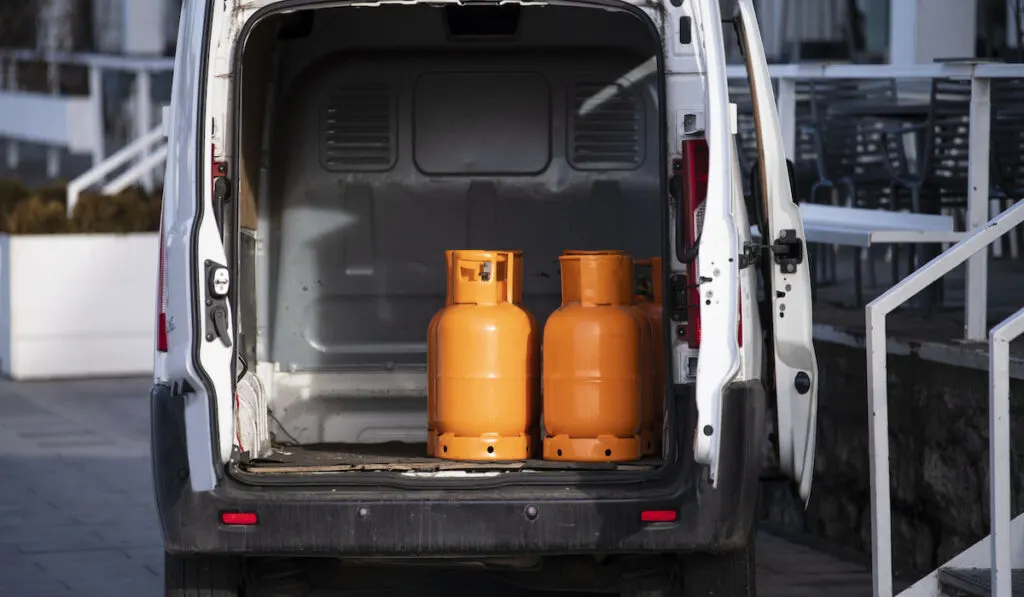
Transporting Propane Tanks Safely
OK, so you’ve checked all the safety boxes by storing your camping propane tank properly. Now you’re ready to go on your camping trip and are wondering how to safely transport it.
Ideally, you’ll be taking a pickup truck or pulling a trailer where you can store the tank without having to carry it in the main cabin with you and other passengers.
If you must take it in the car with you, keep it upright, ensure the valve is securely closed, and take it out of the car once you get where you’re going. Leaving a propane tank in a hot car is unnecessarily risky.
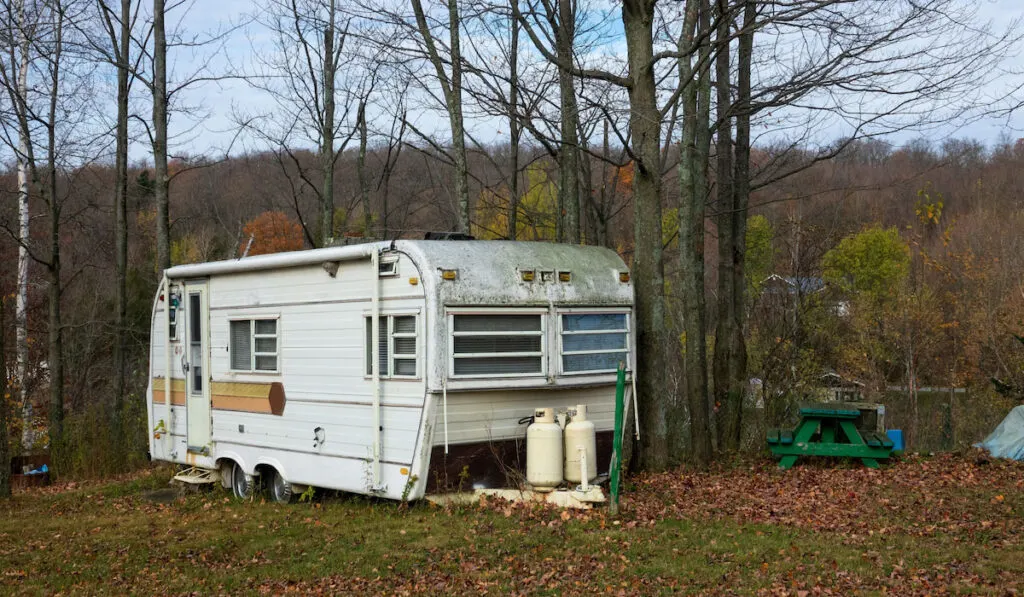
Storing Propane Tanks While Camping
When you are outdoors camping, propane tanks are a fantastic fuel source for lamps, generators, stoves, and more. Propane can help you survive when things are cold or wet and building a traditional campfire isn’t an option.
The same storage principles apply to storing a propane tank on a camping trip: Keep the tank upright and in a cool, shaded area outside when you’re not using it.
You certainly will want to keep it far away from any flames if you’re roasting marshmallows.
Tell any kids with you to leave the tank alone and put it somewhere with less foot traffic to prevent anyone from knocking it over.
Don’t leave the propane tank inside of the tent for the day while you’re out hiking. Tents can be a lot like garages in that they magnify the heat from the sun.
If you’re worried about someone stealing your propane tank, find other nonflammable items you can use to conceal it better. Propane tank theft is rare, so you shouldn’t have any problems.
Other Camping Propane Tank Storage Considerations
Camping propane tanks designed to fuel a small stove or a lamp don’t present the same safety risks as larger tanks that hold more fuel.
Modern propane tanks are very safe, and propane is a stable fuel that more people are using while camping and at home.
Still, there’s no reason to be reckless, and taking small steps can avoid most of the risks associated with using propane.
Here are some things to be aware of if you’re storing propane.
Strange Smells
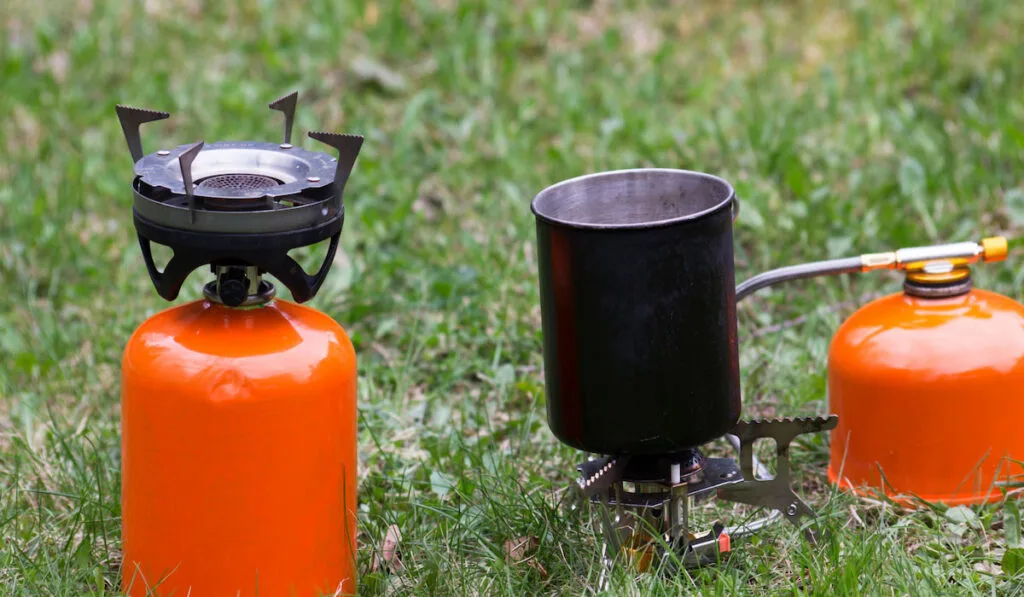
One of the good things about propane is that it has an odor. If you smell something like gas or rotten eggs, then you could have a propane leak.
Hissing
If it sounds like something is escaping from your propane tank, then you need to act. Even when attached to the stove or whatever else you’re using while camping, there shouldn’t be any noise when things are turned off.
The Soapy Water Test
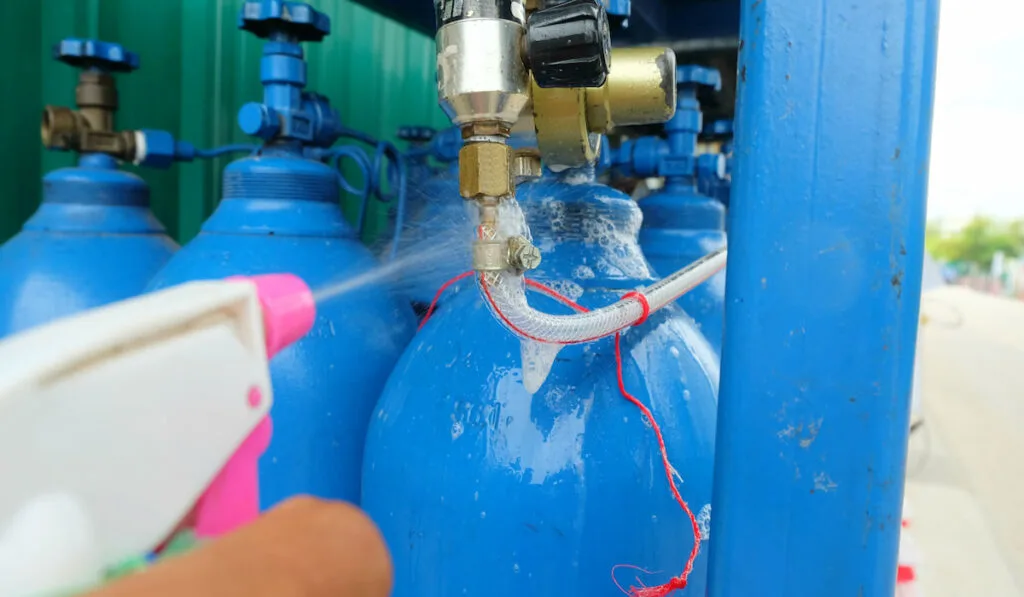
If you suspect a leak in your propane tank, you can coat the valve with soapy water. If there’s a leak, you’ll see air escaping through as bubbles.
Storing Full Propane Tanks
Overall, storing full propane tanks is more dangerous than partially-full or empty tanks. The reason is that full tanks have less room for the gas to expand when things get hot.
When the tank isn’t full, the gas will expand to fill empty portions of the tank when the outdoor temperature rises.
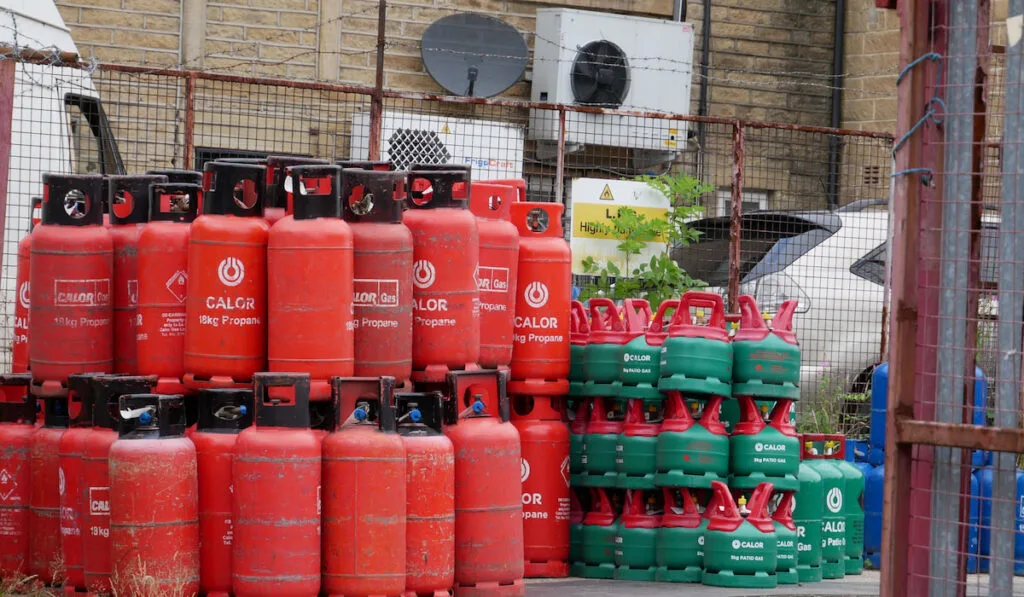
You Can Rent a Propane Tank
Owning and storing a propane tank isn’t your only option.
There are plenty of services across the country that provide rental services for propane tanks on demand. You can pick one up before you go on a camping trip or just rent one during the summer when it’s grilling season. It’s up to you.
However, companies may not rent out small camping propane tanks for small single-burner stoves. They mostly cater to people who want larger tanks seasonally.
Renting services are beneficial because they also take care of all the maintenance. You never have to fill up your tank on your own or worry about whether your valves are in good condition. Worrying about where to store your propane tank during cold winter is never a concern.
Some companies also include propane tank installation with rental plans. Someone will come to your home and attach the tank to your grill or any other appliance safely and for optimal performance.
You don’t have to wonder whether it’s connected correctly. While this isn’t really something campers are interested in, it may come in handy if you need a propane tank for your trailer before a trip!
Final Thoughts
Knowing how to keep your camping propane tank safe and properly stored will give you peace of mind and reduce safety risks on your trip and when you’re not using the tank.
Remember to keep any propane tank upright, outdoors whenever possible, and in the shade. The more you can do to keep temperatures in the safe range, the better off you’ll be.

